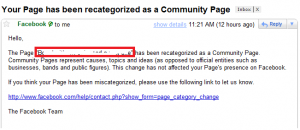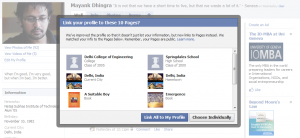At the starting of this month I noticed a new option while creating a Facebook Fan Page and I wasn’t quite sure what was going on and what to expect next. It was yesterday when I stumbled upon this
that things started to fall into place. The info of this page (Electronics and Communication Engg. IIT Guwahati) reads
Our goal is to make this Community Page the best collection of shared knowledge on this topic. If you have a passion for Electronics and Communiation Engg. (Indian Institute of Technology Guwahati), sign up and we’ll let you know when we’re ready for your help. You can also get us started by suggesting a relevant Wikipedia article or the Official Site.
Guess that says it all
- Make this Community Page the best collection of shared knowledge on this topic (Regularly updated/active Content? )
Think of it, if there were to be a decently popular fan page(community page) on anything, say Yoga or Soccer then it would get updated regularly and would have tons of discussions going on it. This page on Soccer would have far more content than any other page on the same topic and it shouldn’t be difficult to guess the SEO juice it will derive and how advertiser friendly that page is going to be. - If you have a passion for Electronics and Communiation Engg. (Indian Institute of Technology Guwahati), sign up and we’ll let you know when we’re ready for your help. (Wikipedia?)
Yes, another community driven page which could have a few administrators or content curators that’ll ensure that the activity on the community page is sustained.
So while everyone happily takes care of the content and discussions, facebook sells the ad space at a premium to advertisers and earns $$. That’s not it, to facilitate the creation of numerous community pages like the one on E &C IIT Guwahati, Facebook has started to automatically create community pages that are up for grabs and might be promoted via ads or news feeds in future.
So what do you think about this move by Facebook? Should Wikipedia be scared?
Update 1: There’s something more to the move by Facebook around Community Pages. Apparently they’ve started re-categorizing the generic pages(non brands/company pages) as Community Pages. Here’s an email I received about one of the pages I had created a while back
Clicking on the link(for mis-categorizing) leads here
Does this move worry all those who created pages around various social objects/activities? I think so.
Update 2 (1/5/2010):
While logging on to Facebook for the first time yesterday, I saw this notification
As expected Facebook is indeed on a big mission to turn all the information into community pages. So now all the interests, favorite shows, books etc in my profile are linked to their respective community pages.
Another social wiki in the making
Update 3 (23/8/2010):
Just saw this.

The community pages now also have a Wikipedia tab which pulls in all the information about the subject from Wiki. Let’s see how things shape up from here.





